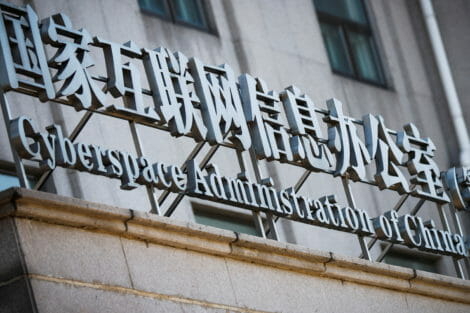
FILE PHOTO: A sign above an office of the Cyberspace Administration of China (CAC) is seen in Beijing, China July 8, 2021. REUTERS/Thomas Peter
HONG KONG/BEIJING — China’s cyberspace regulator has drafted new guidelines that will require the country’s large internet companies to obtain its approval before they undertake any investments or fundraisings, sources familiar with the matter said Wednesday.
The proposed requirements from the Cyberspace Administration of China (CAC) will apply to any platform company with more than 100 million users, or with more than 10 billion yuan ($1.58 billion) in revenue, they said.
Any internet firm involved in sectors named on the negative list issued by China’s National Development and Reform Commission (NDRC) last year will also need to apply for approval, the sources said.
Some internet companies have already been briefed, they added, and the draft rules are still subject to changes.
The sources declined to be identified as the information was not yet public. The CAC did not immediately respond to a Reuters request for comment.
The proposed rules would intensify the oversight from China’s increasingly assertive regulators, who have over the past year reined in formerly freewheeling internet giants in areas from dealmaking to their handling of user data.
It was not immediately clear what types of investments or fundraisings could be impacted. One senior technology industry executive said there were concerns about whether it would be applied to private market investments, such as pre-IPO private funding rounds.
China has routinely updated a negative list prohibiting foreign investment in sectors such as compulsory education institutions, news organizations, and rare earth minerals. Late last year, the NDRC required companies in such sectors to obtain clearances from regulators before they can list their shares outside the mainland.
Chen Weiheng, partner and head of U.S. law firm Wilson Sonsini’s Greater China practice, said the reported CAC “internal practice guidance”, if confirmed, could significantly impact the investment landscape of the internet and “even end the era for big internet platform operators to build an ecosystem through investments.”
“The development appears to be driven by the regulatory considerations of continued antitrust concerns in the internet space and the need to oversee the investment activities of major listed internet companies…it would be a logically consistent move with the prior antitrust and VIE-related regulatory actions.”
Chinese tech giants such as Alibaba Group, Tencent Holdings, Meituan, and ByteDance have created large empires over the years by acquiring or investing in smaller players, practices which Chinese regulators now criticize as monopolistic and unfair to their users.
Some of these firms have over the past year been subjected to a host of punishments, including fines for not reporting past deals and for monopolistic behavior. From February 15, China will also require companies with data on more than 1 million users to undergo a security review before listing their shares overseas.
Tencent was Asia’s third most active investor in the fourth quarter with investments in 39 companies, following Sequoia Capital China and Hillhouse Capital Group, according to data from CBInsights. Xiaomi invested in 31 companies in the fourth quarter.
China’s venture funding totaled $90.1 billion in 2021, up 52% year-on-year, the data showed.
A private equity investor who declined to be identified said the draft rules could make big internet companies slow their investments, leaving more room for smaller, independent start-ups to survive and thrive.
It could also impact valuations because these corporate giants were less sensitive about valuation but more about getting a strategic advantage over their competitors, he said.
“With the gradual exit of those strategic corporate investors, there will be less competition in the industry.”
($1=6.3483 Chinese yuan)